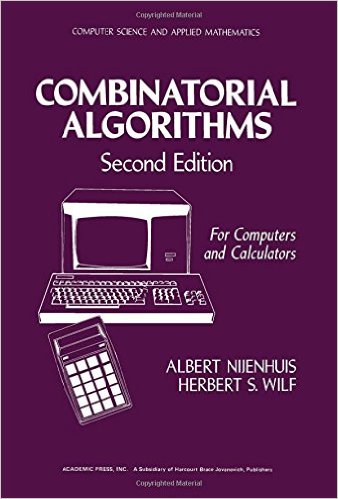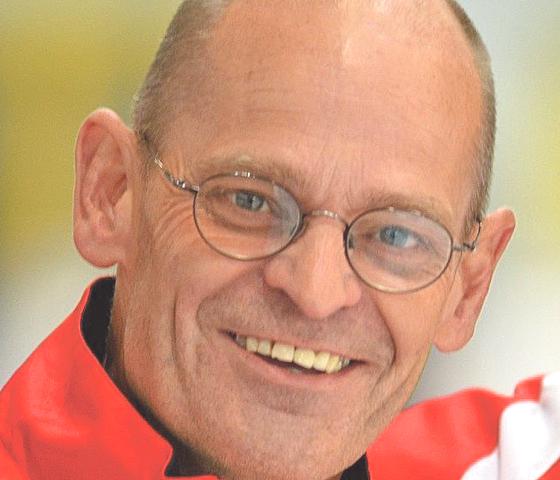
Combinatorial Algorithms for Computers and Calculators, Second Edition
An easy-to-read introduction to Combinatorial Algorithms for any graduate student of mathematics or computer science. Provides a kit of building blocks with which the reader can construct more elaborate structures of his or her own.
Tag(s): Mathematics
Publication date: 01 Jun 1978
ISBN-10: 0125192606
ISBN-13: 9780125192606
Paperback: 316 pages
Views: 24,836
Combinatorial Algorithms for Computers and Calculators, Second Edition
 An easy-to-read introduction to Combinatorial Algorithms for any graduate student of mathematics or computer science. Provides a kit of building blocks with which the reader can construct more elaborate structures of his or her own.
An easy-to-read introduction to Combinatorial Algorithms for any graduate student of mathematics or computer science. Provides a kit of building blocks with which the reader can construct more elaborate structures of his or her own.
Publication date: 01 Jun 1978
ISBN-10: 0125192606
ISBN-13: 9780125192606
Paperback: 316 pages
Views: 24,836
Document Type: N/A
Publisher: Academic Press
License: n/a
Post time: 06 May 2007 01:07:30
Herbert S. Wilf wrote:Reproduction of the downloaded version is permitted for any valid educational purpose of an institution of learning, in which case only the reasonable costs of reproduction may be charged. Reproduction for profit or for any commercial purposes is strictly prohibited. It is not permitted for a web site other than this one to offer the book directly for downloading. Other web sites are cordially invited to link to this page, but must not take the file and offer it themselves.
Excerpts from the Introduction:
This book can be read at several levels. Those whose only need is to use one of the computer programs can turn immediately to those pages and satisfy their wants. Thus, on one level, this is a collection of subroutines, in FORTRAN, for the solution of combinatorial problems.
At the other extreme, pure mathematicians with no need of computer programs will find much that is new and hopefully interesting in these pages. For example, in the special section Deus ex Machina (pp. 78-87), the random selection algorithms of Chapters 10, 12, and 29 are shown to be manifestations of a general phenomenon which sheds light on a number of seemingly unrelated threads of research in combinatorial analysis.
Between these two extremes is a rapidly growing category of (frequently youthful) persons who have access to a fancy calculator (hand-held or table-top). They may not be interested in either the de tailed mathematics or the FORTRAN programs - yet we hope they will find much to stimulate them and help them prepare their own programs.
Our hope, however, is that many readers will want to follow the entire road from general mathematics to particular mathematics to informal algorithm to formal algorithm to computer program and back again, which occurs in virtually every chapter of the book.
Our other hope is that readers will view these methods and programs as a beginning set of building blocks for their own kit of tools and will go on to add to these tools to meet their own needs, so that the contents of this book will be not a collection of pretty artifacts to be looked at but basic elements of the growing and working equipment of scientific investigation and learning.
Tweet
About The Author(s)
Albert Nijenhuis (1926 – 2015) was a Dutch-American mathematician who specialized in differential geometry and the theory of deformations in algebra and geometry, and later worked in combinatorics. His early work was in the area of differential geometry. After 1964, his interests shifted to combinatorics. Much of his work was done with Herbert S. Wilf, with whom he published a book in 1975. After retiring, his interest in differential geometry was rekindled. His last conference presentation and paper were presented when he was nearly 70.

Albert Nijenhuis (1926 – 2015) was a Dutch-American mathematician who specialized in differential geometry and the theory of deformations in algebra and geometry, and later worked in combinatorics. His early work was in the area of differential geometry. After 1964, his interests shifted to combinatorics. Much of his work was done with Herbert S. Wilf, with whom he published a book in 1975. After retiring, his interest in differential geometry was rekindled. His last conference presentation and paper were presented when he was nearly 70.
Herbert Wilf (1931-2012) was the University of Pennsylvania Thomas A. Scott Emeritus Professor of Mathematics. He was the author of six books and more than 160 research articles. From the 1950's, he was a pioneer in the mathematical programming of early computers, beginning with his work at Nuclear Development Associates, which led to his book Mathematical Methods for Digital Computers, written with A. Ralston. His early work focused on numerical analysis and complex analysis, and led to numerous research papers as well as a textbook, Mathematics for the Physical Sciences.
.jpg)
Herbert Wilf (1931-2012) was the University of Pennsylvania Thomas A. Scott Emeritus Professor of Mathematics. He was the author of six books and more than 160 research articles. From the 1950's, he was a pioneer in the mathematical programming of early computers, beginning with his work at Nuclear Development Associates, which led to his book Mathematical Methods for Digital Computers, written with A. Ralston. His early work focused on numerical analysis and complex analysis, and led to numerous research papers as well as a textbook, Mathematics for the Physical Sciences.